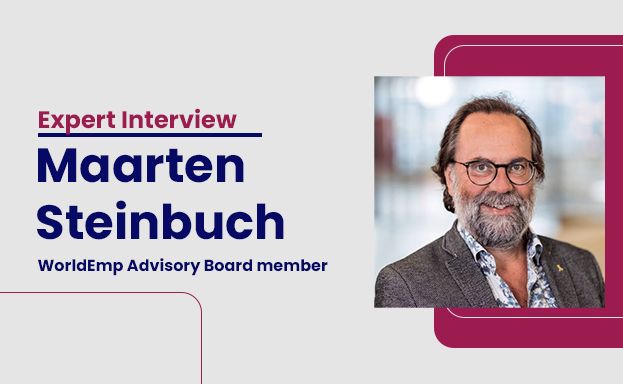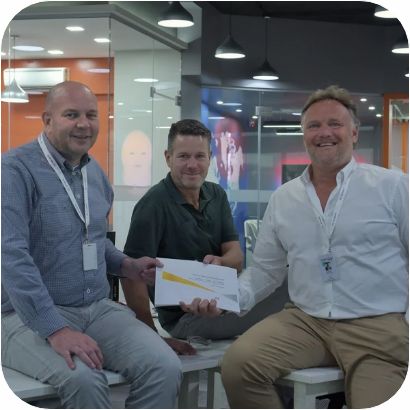- More than 20 years experience
- Complete assessments
- No agency fees

In conversation with Maarten Steinbuch: insights from an advisory board member at WorldEmp
We spoke with Maarten Steinbuch, a member of the Advisory Board at WorldEmp, about his insights on the staffing shortage in the High Tech sector and the role that remote workers, including digital knowledge migrants, can play in addressing this issue.
With his extensive experience in mechatronics and years of involvement in the High Tech sector, Steinbuch shares his vision on the current challenges and potential solutions for companies seeking highly skilled talent.
Background and experience of Maarten Steinbuch
“In my work as a research leader in mechatronics, especially with high-tech systems, there’s always a need for highly skilled personnel,” Steinbuch explains. “Without that expertise and those skills, we simply cannot meet the demand.”
The rapid growth in the Brainport region was a major factor that drew him to WorldEmp. “Here in Brainport, we’re experiencing remarkable growth. We’ve become a global player in precision mechanics and mechatronic systems, and we need a great deal of talent to maintain this position. WorldEmp allows us to expand our search beyond the local labor market. It’s truly a valuable addition.”

The talent shortage in the Brainport region: impact on businesses
Steinbuch describes the talent shortage in the Brainport region as a pressing issue. “Look, even with initiatives like Project Beethoven, which aims to double the number of graduates, we’re still struggling to meet demand. And then you have the housing shortage, which only exacerbates the problem,” he says.
According to him, the shortage of qualified personnel is stalling growth for companies in the sector. “Businesses want to move forward, to innovate, but that’s not possible if you lack the people,” he explains. “And if you’re not progressing, you’re falling behind in the global market. That’s the reality.”
Knowledge migrants and housing shortages: critical factors for talent retention in high-tech
Steinbuch underscores the importance of knowledge migrants: “They’re absolutely essential. Without them, we can’t fill the vacancies, and companies literally come to a standstill.” Foreign talent, he believes, not only brings more capacity but also fresh ideas that benefit the Dutch economy. “Think diversity, think innovation. That’s what knowledge migrants offer us.”
However, he points out that the housing shortage in the Netherlands, particularly in regions like Eindhoven, significantly hinders the influx of knowledge migrants. “Our student numbers are growing fast, but there simply aren’t enough houses. This makes it difficult for new employees, and even Dutch residents, to settle here. So, the housing crisis is an additional obstacle for companies trying to attract talent.”
.jpg&Crop=7&Format=webp&Quality=90&Compression=80&Width=1200)
“Without knowledge migrants, we can’t fill the vacancies, and companies literally come to a standstill.”
Free Recruitment and 40-70% Lower Labor Costs
In the long term, your company can scale up easily and risk-free by accessing a large talent pool in countries with highly skilled workers.
Digital knowledge migrants as a solution
Steinbuch views digital knowledge migrants as a promising solution to the high-tech sector’s talent shortage. “A digital knowledge migrant works remotely but is truly part of the team. We saw this during the pandemic; it can work very well.”
He believes that companies can tap into a global talent pool without being limited by local issues like housing.
He encourages companies considering digital knowledge migrants to simply take the plunge: “Just give it a try! The benefits are substantial, and you can fill a significant portion of those open positions. Start somewhere and see what works.”
Steinbuch stresses that learning by doing is the best way to make remote collaboration a success.
In conclusion: collaborating for a sustainable future of talent and innovation
Finally, Steinbuch emphasizes that the talent shortage can only be solved if all options are explored. “We need everything: more technical education, more women in tech, knowledge migrants, and even asylum seekers who are ready to work.”
Digital knowledge workers also need to be fully embraced. “They often bring a fresh perspective, new insights. This strengthens our market. So, to companies I’d say: embrace that learning curve. Learn and do—it opens up new possibilities.”
Thank you, Maarten, for your insights. We look forward to sharing this vision and helping companies achieve their international ambitions!

INTERESTED? MORE INFORMATION?
Digital knowledge migrant with WorldEmp.
At WorldEmp, we understand the challenges of finding qualified and highly skilled talent. We offer a unique solution for companies looking to benefit from digital knowledge migrants without the usual pitfalls. Our approach is based on years of experience and a deep understanding of both the technological and human aspects of remote work.
Our services include recruiting and selecting highly qualified professionals from around the world. We ensure that each candidate is not only technically skilled but also culturally aligned with your company. This helps minimize communication issues and maintain strong team cohesion.
Additionally, we provide comprehensive support in terms of technology and tools. We ensure your team has access to the best tools for communication and collaboration, and offer training and support to ensure everyone can use these tools effectively.




